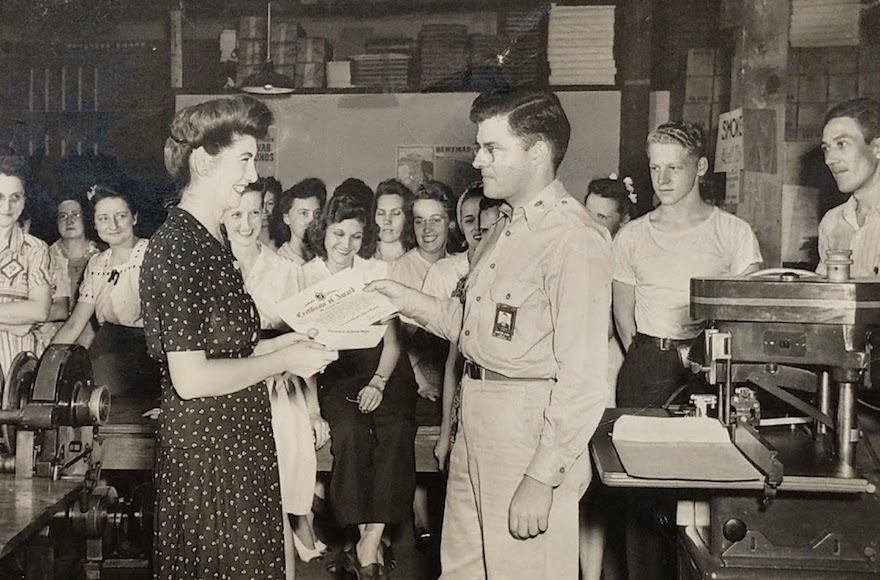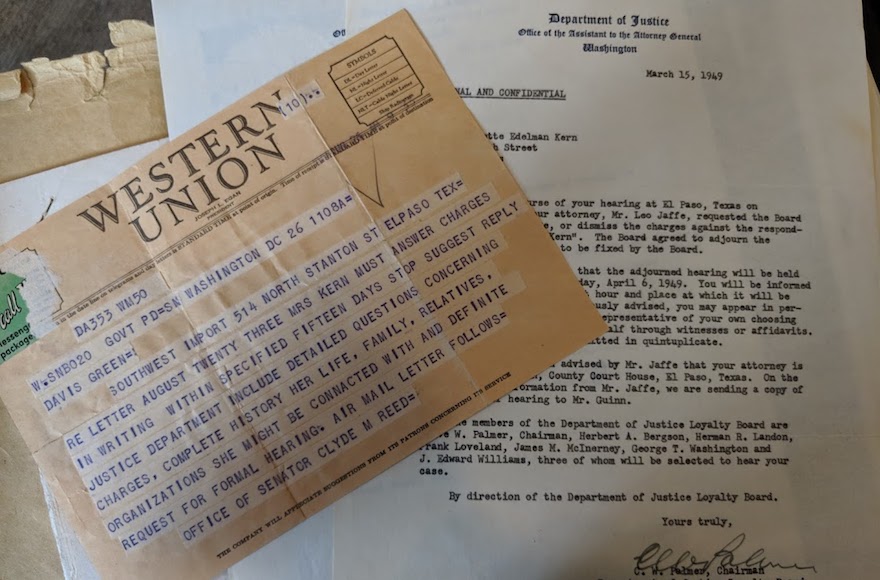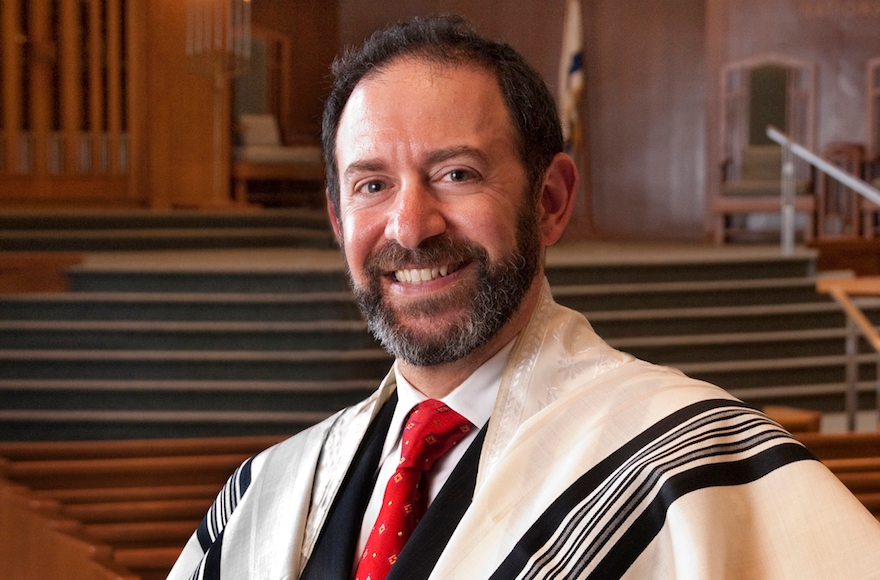When America doubted my Jewish grandmother’s loyalty
Published November 12, 2018

Jeanette Kern, left, receiving one of the two commendations she received for her work during World War II as a clerk in the Army Signal Corps, July 27, 1944. (Courtesy of Oren Hayon)
HOUSTON (JTA) — After my grandmother Jeannette died in December 1996, the process of settling her estate worked in the same way it does in most families: There was a house to be sold and possessions to be distributed.
The surviving family members were left with a few souvenirs of my grandparents’ lives and a hefty mound of paperwork to be processed: health insurance and pension forms, tax documents and medical documents, all neatly packed into cardboard boxes and thick manila envelopes.
In the 20-plus years since the estate was resolved, I hadn’t given much thought to those mounds of paperwork until last month, when my mother and I found a curious file among my grandmother’s belongings. It was a large black binder marked “CONFIDENTIAL,” stuffed full of letters and memoranda typed on crinkly onionskin paper and featuring the seal of the Department of Justice stamped on its cover. As I pored through the hundreds of typed pages packed into the binder, I began piecing together this story about loyalty and patriotism. Those documents, whose contents are described here, testify to an uneasy chapter of our nation’s history and my family’s role in it.
My first impression was that finding a confidential government file in my grandparents’ paperwork was unusual, but by no means surprising, since both of them had spent time as federal government employees. In addition to his military service, my grandfather Lou had been employed by the Works Progress Administration and the Postal Service. My grandmother had worked for the Department of the Interior and later for the Immigration and Naturalization Service.
She in particular had distinguished herself with exemplary service on behalf of the United States. While Lou was fighting overseas during World War II, my grandmother took a job as a clerk in the Army Signal Corps, where she received two commendations for her contributions toward the war effort.
After the war, and my grandfather’s safe return to the United States, Lou and Jeannette Kern move from New York to El Paso, Texas, where Jeannette begins her job with INS, processing deportation paperwork for foreign nationals. One day, in the early fall of 1948, a telegram arrives at their home addressed to my grandmother. Its terse syntax barked: “reply justice department … detailed questions concerning charges, complete history her life, family, relatives, organizations she might be connacted [sic] with and definite request for formal hearing.”
The two of them must have been baffled: “justice department”? “formal hearing”? What on earth could this mean?
A test of loyalty
Soon afterward, a letter from Washington, D.C., makes everything chillingly clear: Jeannette has been charged with “sympathetic association with the Communist Party of the United States … within the purview of Executive Order No. 9835.” The letter contains no additional details, but it advises that a hearing on Jeannette’s case will be held on Nov. 16, 1948.
Jeannette and Lou quickly dash off panicked letters to an attorney friend of theirs seeking answers. How should they respond to the charges? Could this be a mistake? The charges of Communist sympathy are false, of course, but what would the taint of these accusations mean for their livelihood? What would it to do their infant daughter – my mother – who has just turned a year old?
They write a letter to Kansas Sen. Clyde Reed, a member of the Senate Judiciary Committee, asking for his assistance and guidance, but receives a letter from Washington advising them that Reed is on vacation and unable to respond. The correspondence from my grandparents makes it clear that genuine fear had begun to set in.
November quickly arrives, and Jeannette dutifully appears, as directed, before the Loyalty Board, set up by order of President Harry Truman the year before to root out communists among federal employees and job applicants. She is, understandably, unsure about what to expect.
The hearing minutes record her appeals to the committee that she be given additional time to retain a lawyer and prepare a defense. The committee, hoping for a swift resolution of the charges, initially is disinclined to grant the request, but after several rounds of back-and-forth negotiation the members are convinced to accept a postponement. The hearing is pushed back to April 6, 1949.
This is good news for my grandmother, of course, but her relief is short-lived. In this El Paso courtroom, she sees something that makes her heart sink: It’s the court stenographer. She knows her. It’s a woman named Connie, a notorious gossip who works in the steno pool at my grandmother’s office. Jeannette realizes with a growing sense of panic that news about this hearing will surely spread throughout her workplace and beyond. Any hopes she may have had for a discreet and anonymous dismissal of the false accusations leveled against her have instantly evaporated.

A letter from the Justice Department Loyalty Board dated March 15, 1949, and a telegram from a member of the Senate Judiciary Committee demand that the author’s grandmother answer questions about “the complete history of her life.” (Courtesy of Oren Hayon)
“Do you know the Shapiros?”
The months before the new hearing fly past; Jeannette prepares frantically with the help of an attorney, Ernest Guinn, who will represent her. At last April 6 arrives, and my grandparents appear before the Loyalty Board in the U.S. Court House in El Paso.
Guinn opens with a request that only fair evidence and competent witnesses should be admitted into the record for deliberation. A board member quickly reassures the attorney that Jeannette is not on trial; instead, this is just an informal “administrative proceeding.” But of course this also means, he adds slyly, that the hearing “is not bound by the strict rules of evidence adhered to in the courts.”
After the opening statements, the Loyalty Board lays out their evidence for the charge that my grandmother is a communist.
- Her mother, who lived with them back in the Bronx, New York, had emigrated to the United States from Russia .
- Jeannette had attended a meeting of the “Southern Conference for Human Welfare,” an early civil rights group, and government informants had reported that others who attended these meetings had “communistic sympathies.”
- One of her childhood friends suggested to the FBI that Jeannette was “communistically inclined” after she interfered with the friend’s teenage romance with her boyfriend.
- A statement from a former neighbor stating that “I believe they are Communists because they had large pictures of Lenin and Trotsky on the wall of their apartment.” (This statement was deeply puzzling to my grandparents. Their best guess was that the neighbor had seen family photos of our Jewish relatives, who wore thick beards, and mistook them for Russian revolutionaries.)
The board begins to question my grandmother with intensity. They ask about her employment with the government, seizing on the fact that she had a security clearance, and that her secretarial work had involved administrative tasks with lists of U.S. warships in foreign waters. To counter, Guinn calls upon Davis Green, a close friend of my grandparents, to testify about Jeannette’s patriotism. The Loyalty Board grills him on his political affiliation and points out, for the record, that he is a Democrat who supports liberal causes.
After they finish with Green, the board members turn their attention back to Jeannette and ask about who she knows. Curiously, almost all of the people they inquire about appear to be Jews.
“You know the Shapiros? … Did you associate with a Sarah Klein? … Do you know a person named Anna Gelb? … Do you know an Eva Rosenbaum? … Have you become close friends with Mrs. Nathalie Gross?” they ask.
At this, Jeannette has finally had enough and snaps back in reply: “No, she is positively obnoxious.”
My grandmother’s Jewish identity continues to hold the Loyalty Board’s attention. The members ask at length about her work with Zionist organizations and her involvement in “the Palestine situation.” The interrogation includes numerous questions about the Yiddish press: “Do you read newspapers from New York? … Do you read the Morning Freiheit? … Did the Daily Worker come in to your home?” The board even calls my grandparents’ rabbi, Joseph Roth, to testify about their character.
Eventually the Loyalty Board exhausts its questions about Jeannette’s Jewish identity and turns its attention to the time and money she devotes to social welfare causes in her community, which appear to raise certain suspicions in their minds. Yes, she asserts, she has been trying “to do a little bit to help” with racial tensions in Texas.
“I remember one time a white man killed a Negro woman, and he was being set free,” she recounts. “[I tried] to interest people in becoming more community conscious.”
The board seems to think that Jeannette’s sympathy for the victims of racism is a sign of communist tendencies. The members ask pointedly, “You are not opposed to employing Negroes as household servants? Or Mexicans?”
Changing tactics, they begin asking Jeannette about her political opinions: Should the U.S. abandon its position in Berlin? Are you in favor of the Marshall Plan? And the Atlantic Pact? Are you for the abandonment of our position in Japan? Noting that her husband had been stationed in the Philippines during the war, they ask if she would have liked our overseas soldiers to come home quickly. She agrees that she would have, and they pounce on her, exclaiming that this position “happened to be a Communist Party line.”
The transcript continues through many more pages, and it includes the testimony of numerous witnesses and voluminous material (Exhibits A through T) introduced as evidence. Eventually the Loyalty Board has heard enough and adjourns the hearing to begin its deliberations.
My grandmother goes home and waits. She doesn’t hear anything for 2 1/2 months.
It’s hard to imagine how frightened and trapped she must have felt. She was a new mother with few friends in a community she did not know well, forced to defend herself against false accusations that, even if disproven, would threaten her professional livelihood and reputation. And she was swiftly arriving at the conclusion that some of the things she believed in most strongly – Jewish life, progressive politics, racial equity, the safe return of U.S. soldiers – could be used as evidence that she was a communist and a threat to America.
Patriotism and xenophobia
At last, on June 25, 1949, she receives her verdict: a letter affirming in a one-sentence statement that the Loyalty Board of the U.S. Department of Justice has ruled in Jeannette’s favor, and that all charges against her have been dismissed.
Up until a few weeks ago, no one besides my grandmother knew about the existence of the black binder. My best guess is that she kept her story a secret because of how painful the memories were. It must have been difficult for her to have been reminded about how simple it was for an overzealous government bureaucrat or a grudge-wielding neighbor to derail a fellow American’s good reputation and cast doubt on her patriotism.

Rabbi Oren Hayon says the rising anti-Semitism in America is again “garbed in the belief that Jews cannot be fully American.” (Courtesy of Hayon)
As I reflect on these events in my grandmother’s life, I am left wondering if our country has learned anything at all since she sat in that El Paso courtroom. And I confess that these reflections do not leave me feeling terribly cheerful.
Today, Jews are still painfully aware that no matter how “American” we may feel, we can easily be accused of having divided loyalties. Politicians sow fear of immigrants, stoking suspicion among neighbors. A simple mistake, a scurrilous rumor or “foreign-looking” family members can leave many among us vulnerable to others’ suspicions that we cannot be trusted – or, as we have seen in recent days, vulnerable even to violence.
My grandmother’s case offers an early glimpse into this aspect of our national culture, which would continue to corrode in the years that followed. Her hearing in the spring of 1949 was 5 1/2 years before Senator McCarthy would finally be chastened with the famous rebuke “Have you no sense of decency, sir?”
We are – thankfully – several decades beyond the paranoia of McCarthyism, but its tenacious cells still sleep in the veins of fear beneath our nation’s skin. Today one can witness firsthand how easily some Americans’ love of our country can metastasize into a strain of xenophobia so pernicious that they can be convinced to turn against their fellow citizens.
Seventy years after my grandmother was summoned before a committee of the federal Justice Department, anti-Semitism is ascendant once again across America. And once more it is garbed in the belief that Jews cannot be fully American, that our values threaten the integrity of the nation which has been our beloved home for centuries.
When we discovered the nondescript black binder among my grandmother’s belongings, we had no idea what secrets it would hold. We could never have predicted the story that those yellowing photographs and official documents would tell. And, I confess, we never expected that the historical territory through which that binder led us would look quite so familiar.
(Oren J. Hayon is the senior rabbi of Congregation Emanu El in Houston, Texas.)
The views and opinions expressed in this article are those of the author and do not necessarily reflect the views of JTA or its parent company, 70 Faces Media.















